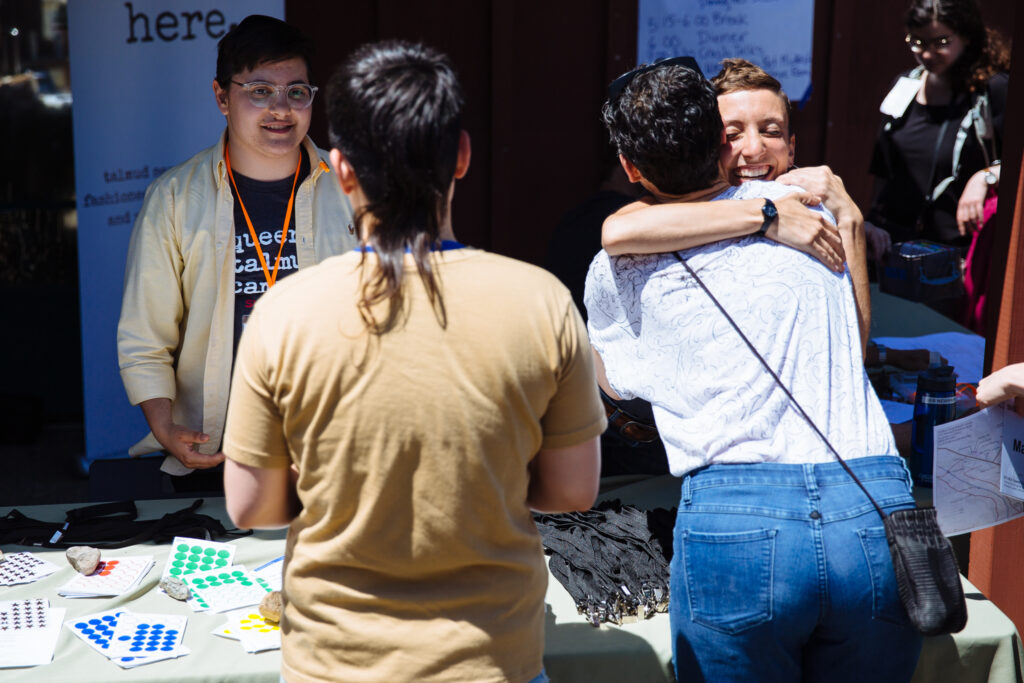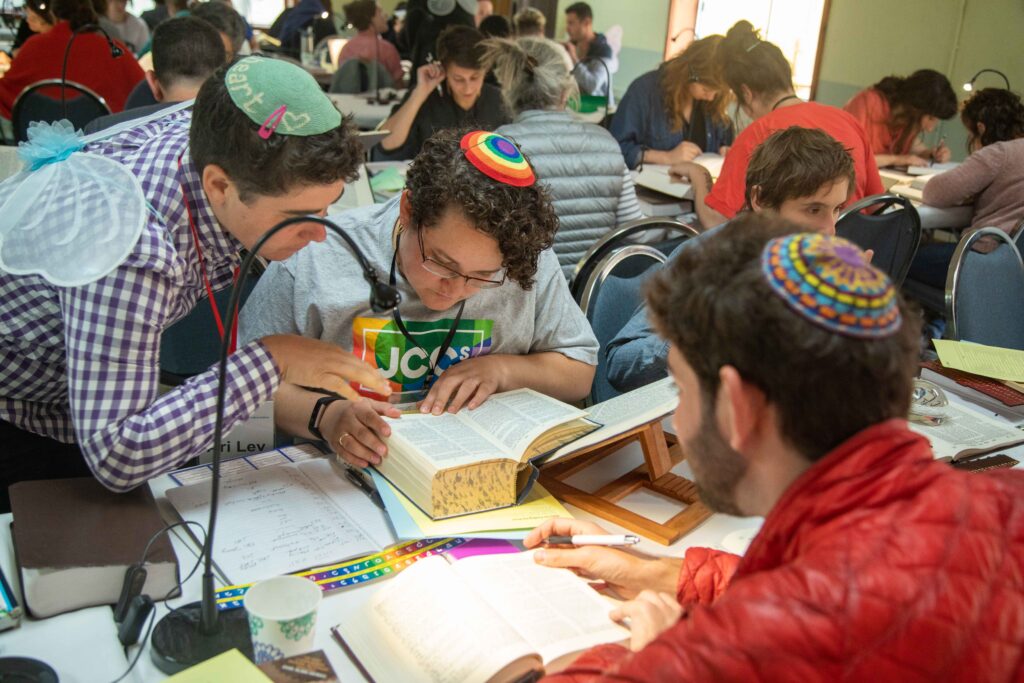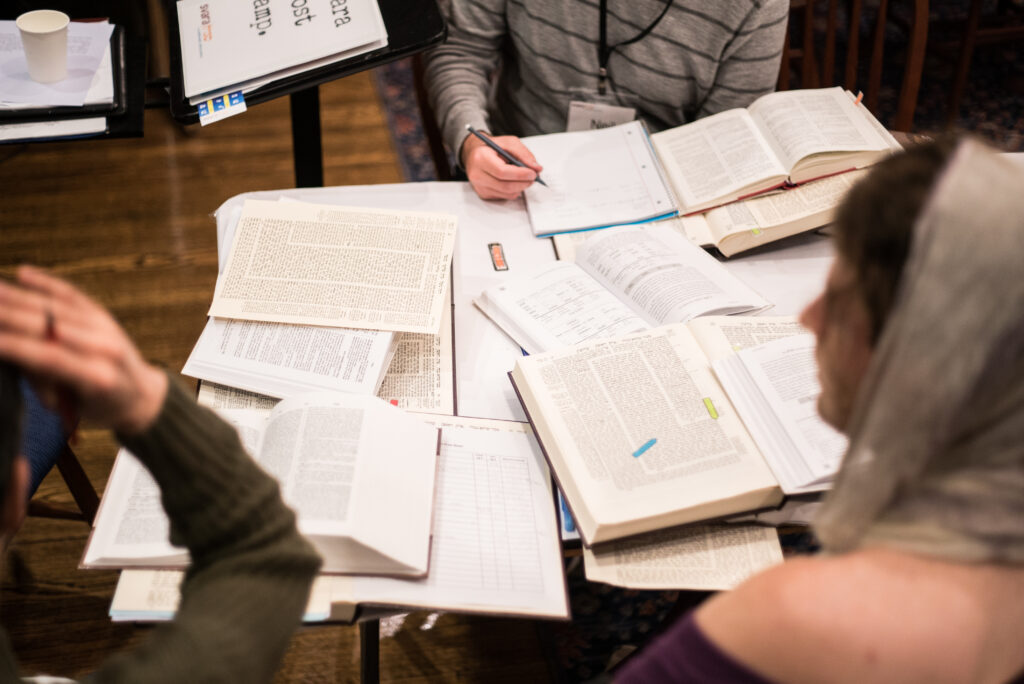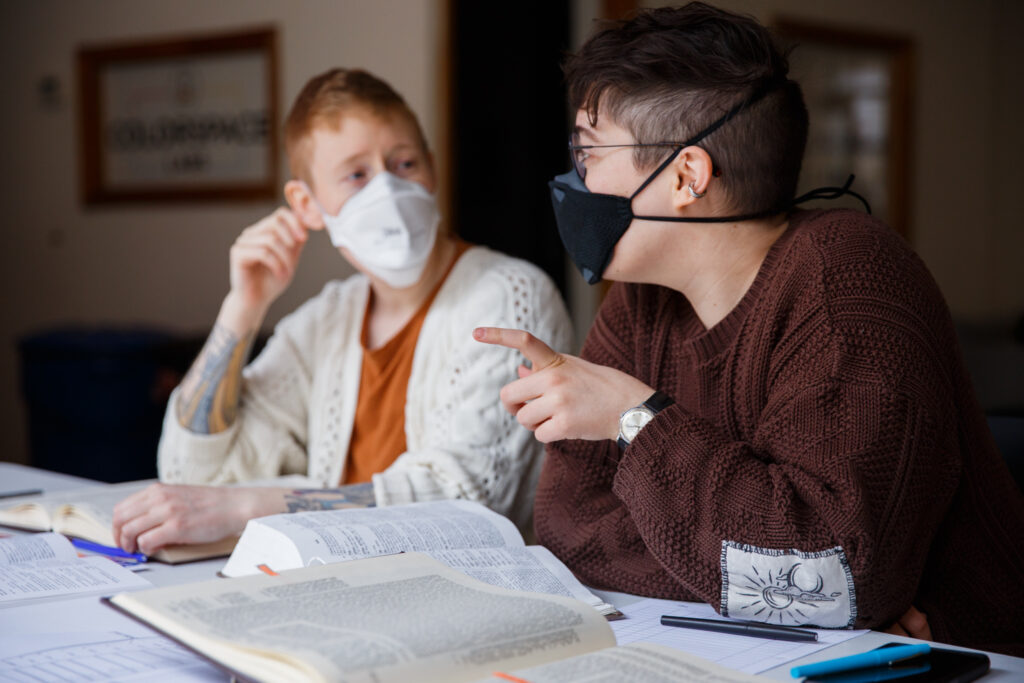Nichum or nechemta, which mean comfort and consolation, are key words at this point in the Jewish calendar. We’ve come through the labor of grieving on Tisha B’av– we’ve faced destruction, despair, and our hearts have broken for the brokenness of our world. The Shabbat following Tisha B’av is known as Shabbat Nachamu, the shabbat of comfort, named for the lines of the haftarah, Isaiah’s opening cry: נחמו נחמו אני, “Comfort, comfort, my people!” (Isaiah 40:1) Now we find ourselves in the seven weeks of consolation between Tisha B’av and Rosh Hashanah, in which each week’s haftarah continues to offer messages of compassion, consolation, and gentle healing to the Jewish people. It is here that we are meant to ease our way into the work of heshbon hanefesh and teshuvah, the transformative processes of the high holidays.
I’m not always sure how to draw the connection between nechemta and the work of teshuvah, but this year as I enter the cycle, two texts are guiding me through.
This past spring, I unpacked a text with the learners of a SVARA shiur exploring Rabbinic power and authority, a text in which Rabban Gamliel and Rabbi Yehoshua famously face-off, and Rabbi Akiva shows up as conflict mediator.
In a long, unusually narrative mishnah that begins on Rosh Hashanah 24b, Gamliel and Yehoshua are embroiled in a disagreement about the testimony of witnesses concerning the new moon. What’s at stake in the argument is the establishment of the calendar for the Jewish diaspora. Rabban Gamliel, who is the nasi, the head of the Sanhedrin, repeatedly accepts testimony from witnesses whose stories seem corrupted or confused (to the chagrin of his colleagues) and a number of rabbis weigh in oppositionally, claiming that the witnesses are delivering false testimony. When Rabbi Yehoshua offers a thought, Rabban Gamliel turns against him, perhaps because he’s at the end of his rope with these other rabbis questioning his judgment. Perhaps it could be an attempt to make an example out of Yehoshua, we don’t exactly know. But, wanting to flex his power and ultimate authority with regards to the calendar, Gamliel orders Yehoshua to gather his walking stick and money, and to travel to Yavneh on the day that Yehoshua estimates is Yom Kippur (i.e, he requires Yehoshua to violate the holiest day of the year in a number of ways, including travel, carrying, and interacting with money). Since Rabbi Yehoshua and Rabban Gamliel have different calculations of what day Yom Kippur will fall on, due to their distinct understanding of the testimony of the witnesses, Rabban Gamliel doesn’t consider his decree on Rabbi Yehoshua to be a violation of halakha. But Rabbi Yehoshua, who does consider this to be a violation of Yom Kippur by his own count, is devastated.
Two versions of the story follow, and this is where Rabbi Akiva enters the story. In our mishnah, Rabbi Akiva finds Rabbi Yehoshua in a state of meytzer– grieving, deep distress. Up to now, I can identify strongly with this moment. There’s a conflict between two people. It’s a high stakes conflict, as one of the parties involved (Gamliel) has greater authority than the other. A person is in distress. A friend/colleague approaches him, probably to console or support him. To offer advice, to listen.
But what Akiva offers Yehoshua is stunning: a midrash.
יֵשׁ לִי לִלְמוֹד שֶׁכּל מַה שֶּׁעָשָׂה רַבָּן גַּמְלִיאֵל עָשׂוּי, שֶׁנֶּאֱמַר: ״אֵלֶּה מוֹעֲדֵי ה׳ מִקְרָאֵי קֹדֶשׁ אֲשֶׁר תִּקְרְאוּ אֹתָם״, בֵּין בִּזְמַנָּן בֵּין שֶׁלֹּא בִּזְמַנָּן — אֵין לִי מוֹעֲדוֹת אֶלָּא אֵלּוּ.
I can learn [from a verse] that everything that Rabban Gamliel did is done (i.e, it is valid). As it is written: “These are the appointed seasons of God, sacred convocations, which you will proclaim them…” (Leviticus 23:4). Whether you have proclaimed them at their proper time, or whether you have proclaimed them not at their proper time, there are no holidays to me other than these.
By clipping the verse and eliminating its final word, “בְּמוֹעֲדָם” “in their season,” Akiva has chosen to read the verse from Leviticus with an added emphasis– minimizing the idea that the holidays have an objective “correct” season or time, and instead emphasizing that the authority to determine the days on which holidays fall is firmly within human hand. Whether they are correctly or incorrectly determined, there are only the holidays determined by the court and there is no more perfect or true calendar than one created by human imperfection. Thus, Rabban Gamliel acted within his jurisdiction as head of the Sanhedrin, even determining that Yom Kippur would fall on a possibly “incorrect” day of the calendar.
This is actually the first of two midrashim Akiva offers Yehoshua. On the next daf, the Stamma revisits our mishnah, seemingly interested in digging deeper. And here, the Stamma gives us a new take on the dialogue that occurred:
תָּא שְׁמַע, דְּתַנְיָא: הָלַךְ רַבִּי עֲקִיבָא וּמְצָאוֹ לְרַבִּי יְהוֹשֻׁעַ כְּשֶׁהוּא מֵיצֵר, אָמַר לוֹ: רַבִּי מִפְּנֵי מָה אַתָּה מֵיצֵר? אָמַר לוֹ: רַבִּי עֲקִיבָא, רָאוּי לוֹ שֶׁיִּפּוֹל לַמִּטָּה שְׁנֵים עָשָׂר חֹדֶשׁ, וְאַל יִגְזוֹר עָלָיו גְּזֵירָה זוֹ
Come and hear, as it is taught in a baraita: Rabbi Akiva went and found Rabbi Yehoshua in a state of distress, and he said to him: My teacher, for what reason are you distressed? Rabbi Yehoshua said to him: Rabbi Akiva, it is fitting for one to fall sick in bed for twelve months, rather than to have this decree issued against him (that he should have to desecrate Yom Kippur).
אָמַר לוֹ: רַבִּי, תַּרְשֵׁינִי לוֹמַר לְפָנֶיךָ דָּבָר אֶחָד שֶׁלִּמַּדְתַּנִי. אָמַר לוֹ: אֱמוֹר. אָמַר לוֹ: הֲרֵי הוּא אוֹמֵר ״אֹתָם״ ״אֹתָם״ ״אֹתָם״ שָׁלֹשׁ פְּעָמִים.
Rabbi Akiva said to him: My teacher, allow me to say before you one matter that you yourself once taught me. Yehoshua said to him: Speak. Akiva said to him: The Torah states with respect to the Festivals: “The appointed seasons of the Lord, which you shall proclaim them [otam] to be sacred convocations (Leviticus 23:2). And it is written: “These are the appointed seasons of the Lord, sacred convocations; you shall proclaim them [otam] in their season” (Leviticus 23:4). And it is written: “These are the appointed seasons of the Lord; you shall proclaim them [otam] to be sacred convocations” (Leviticus 23:37). Three times the verses use the term: Them [otam], which can also be read as you [atem], in plural.
״אַתֶּם״ — אֲפִילּוּ שׁוֹגְגִין, ״אַתֶּם״ — אֲפִילּוּ מְזִידִין, ״אַתֶּם״ — אֲפִילּוּ מוּטְעִין.
This comes to teach: You [atem] are authorized to determine the date of the new month, even if you unwittingly establish the New Moon on the wrong day; you, even if you do so intentionally; you, even if you are misled by false witnesses. In all cases, once the court establishes the day as the New Moon, and it is sanctified.
Then comes the part of the story that feels most important to me:
בַּלָּשׁוֹן הַזֶּה אָמַר לוֹ: עֲקִיבָא נִחַמְתַּנִי, נִחַמְתַּנִי.
After hearing this, Rabbi Yehoshua said to him in these words: Akiva, you have consoled me; you have consoled me.
What is it about Rabbi Akiva’s offering that consoles Rabbi Yehoshua so profoundly?
This reminded me of a powerful intertext, another place in Talmud where Rabbi Akiva makes a similar move. I’ll summarize it for you here, and you can find it on Makkot 24a-b.
Rabbi Akiva and his companions were traveling past the site of the destroyed Temple. When they arrived at the Temple Mount, they saw a fox coming out of the place that had been the Holy of Holies. They began weeping, and Rabbi Akiva was laughing. They said to him: For what reason are you laughing? Rabbi Akiva said to them: For what reason are you weeping?
They said: This is the place that was once so holy that only priests could tread there, and now foxes walk in it. Shall we not weep? Rabbi Akiva said to them: That is why I am laughing! In the prophecy of Uriah it is written: “Therefore, for your sake Zion shall be plowed as a field, and Jerusalem shall become rubble, and the Temple Mount as the high places of a forest” (Micah 3:12), where foxes are found. In the prophecy of Zechariah it is written: “There shall yet be elderly men and elderly women sitting in the streets of Jerusalem” (Zechariah 8:4) … Now that the prophecy of Uriah was fulfilled, it is evident that the prophecy of Zechariah will also be fulfilled.
The Sages said to him:
Akiva, you have comforted us; Akiva, you have comforted us.
That last line, עקיבא ניחמתנו עקיבא ניחמתנו, uses the same formula and language as Rabbi Yehoshua’s “Akiva you have comforted me, you have comforted me.” Curiously, each story includes the doubling of the phrase– not just one mention of comfort, but two. This is an emotionally evocative moment, and I picture the speakers shaking their heads, smiling with tears in their eyes.
Here are two stories in which Rabbi Akiva comforts– offers nechemta– to distressed and grieving people through the use of midrash.
As I move through Av and toward Elul, as I start to take stock of my relationships in preparation for the high holidays, I’m thinking about one particular friendship in my life. This friend and I have had a rough year together– spiraling into, out of, and back into, an ongoing conflict that we seem unable to resolve. We’ve talked through it many times, but we’re each still holding onto our wounds, our heartache and grief. I imagine many of you are also starting to think about the relationships in your lives and noticing where there is hurt, distance, broken trust, or misunderstanding. It’s what the season asks us to do.
This year as I think about the work of repair, I’m drawn to Rabbi Akiva’s model. He doesn’t sit Rabbi Yehoshua and Rabban Gamliel down and say– “Ok, let’s start from the beginning and each take a turn sharing our side of the story…” He doesn’t engage in the seemingly timeless queer practice of processing. Or rather, he maybe does, but this is the ancient rabbinic model of processing– Midrash. Learning and interpreting Torah. Bringing Torah to the situations of our lives and reading it creatively, flexing the muscles of what Torah can become and how it can speak to our wounds and our grief. Engaging with Torah as a source of comfort.
Because we can’t always control what’s happening to us. Rabbi Yehoshua can’t change the decree Rabban Gamliel has issued upon him. The Rabbis can’t bring back the fallen Temple.
Rabbi Akiva seems to understand this. Changes, crashes, are inevitable– in our personal lives and in our structural world– but the agency and creativity with which we re-work what’s inherited, that’s something active we can lean into. The source of comfort Akiva offers his friends and colleagues is the fluidity of Torah itself. He reads Torah against the grain, spinning the pshat meanings of verses in order to make them applicable and relevant to the situation at hand. He grabs a seemingly mundane repetition of the direct object marker אוֹתַם and re-reads it as the pronoun אַתֶם to imbue the verse with new possibility. He brings verses of prophesy together in order to locate himself and his losses within the Biblical arc of time. In fact, Akiva teaches Yehoshua not one but two midrashic frameworks for understanding his conflict with Rabban Gamliel, and only then does Yehoshua finally feel comforted.
Maybe Rabbi Akiva’s words are a source of comfort in both stories because they are an offering to people who feel stuck or powerless. Akiva offer verses of Torah whose meanings, when read rabbinically, are transformed. Which can become a transformed and transcended way of understanding the situation in which one feels stuck. If we can reimagine Torah, if we can bring a seemingly limited text to our stuck places and reveal its limitless possibility, we might also cultivate a sense that our own selves, our lives, and our relationships, are fluid, in motion, and limitless with possibility.
This year, I find myself wondering, How can learning Torah comfort me? What would happen if my friend and I, the one I feel stuck in conflict with, could sit down and study some Torah together? How might the process of interpretation and midrash offer us a way forward? Or could I spiritually prepare for the relational work of teshuva by studying midrash and letting it soften and stretch my heart toward new possibilities? I’m looking for a path through the tangled brambles of patterns and habits, recurring dynamics and places where it’s hard to forgive or apologize. Rabbi Akiva– conflict mediator, friend and ally, bold and creative reader and teacher of Torah– comes to offer me that path. Another world is possible. Learning like our ancestors has a powerful role to play in getting us there. What a deep source of care, of comfort.







